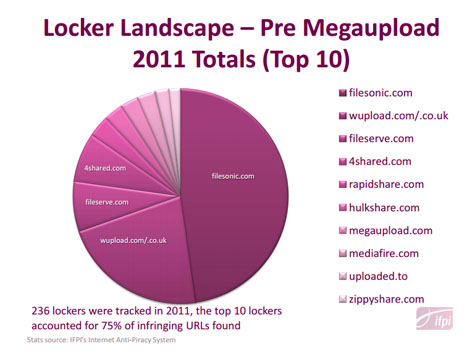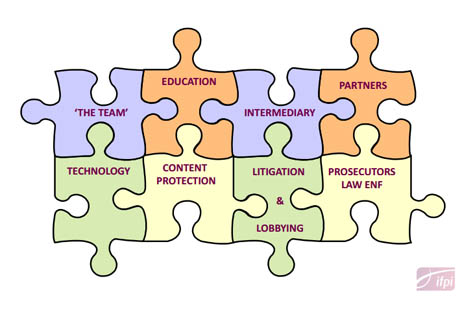TorrentFreak Email Update |
| Leaked Report Reveals Music Industry’s Global Anti-Piracy Strategy Posted: 25 Jul 2012 04:27 AM PDT
The 30-page report presents a global view of IFPI’s “problems”, “current and future threats” and the industry’s responses to them. IFPI says it has five possible reactions to a threat: Take down, Disruption, Investigation, Lobbying and Litigation. The Threats: P2P Initially IFPI splits illicit content availability into two sections. The first they classify as “content held on users’ computers” and distributed via P2P networks such as BitTorrent, Gnutella, DirectConnect, eDonkey and Ares. It says it has taken “strategic action” against The Pirate Bay (BitTorrent), LimeWire (Gnutella) and also the semi-private tracker Demonoid (BitTorrent). IFPI doesn’t elaborate on action against the latter, but it was rumored that a member of the site’s staff was targeted a while back. Central hosting/cyberlockers The second category is content held on central servers, including file-hosts and cyberlockers. Interestingly, the IFPI diagram below shows that when the group examined allegedly infringing URLs on the world’s major cyberlockers, Megaupload’s stats paled into insignificance when compared to the others.  IFPI is clear on their requirements for cyberlockers to operate to their liking. Their number one desire is that they “proactively filter for infringing content” but if they don’t they must “operate an effective and efficient notice and take down system.” Failure to implement either means sites will be required to “shut down”. Hacking and phishing attacks One of the other threats detailed by IFPI include hacking and phishing attacks against email accounts of artists and their management. Through these techniques individuals are apparently obtaining unauthorized access to pre-release music. IFPI say a number of techniques are being used, from bogus emails claiming to be from social networking, email, or cyberlocker sites, to the compromising of password reset features. Once accessed, mail is forwarded to other accounts, either with the music attached or with valuable information which allows other systems to be accessed. The rise of mobile data and applications IFPI is also keeping a close eye on the downloading and sharing of content across mobile data and other wireless networks. IFPI worries that these networks are providing here-and-now streaming of content via all-you-can-eat plans. Making matters worse is that IFPI reports “challenges” when it comes to matching an IP address to a subscriber. The recording group also reports that Apple and Android architectures are encouraging the creation of 3rd party music apps. IFPI say they are crawling both the App Store and Google Marketplace and are focusing on “quick take down agreements” with Apple, Google, Microsoft, Nokia and Palm to remove apps they don’t like. They are also mulling an expansion of their “payment provider program” to target “rogue” Android app developers. Unauthorized pay MP3 sites IFPI say they have identified in excess of 50 Russian and Ukrainian pay MP3 download sites. The group reports that law enforcement authorities have “secured evidence that the illegal sites are annually stealing hundreds of millions of dollars” which is creating opportunities for money laundering and tax evasion investigations. IFPI say their next steps will include strangling the sites’ finances with the help of payment processors, recovering proceeds of crime, and developing asset confiscation. Advertisers and payment processors IFPI’s advertiser strategy is based around the “disruption of revenue streams” to unauthorized sites by several methods. In the report they speak of a “structured notice and take down programme targeting Google's AdSense and DoubleClick advertising networks,” plus “out reach” to IASH and IAB to implement “comprehensive infringing block lists.” IFPI says it also initiates direct contact with advertisers to flag when their ads appear on infringing sites. Agreements are said to be in place with VISA, MasterCard, PayPal, CTIA, Monitise, PaySafeCard and PhonePayPlus to strangle finances to unauthorized sites. Dealing with Internet service providers In common with cyberlockers, IFPI have a set of rules they’d like to impose on Internet service providers. According to the industry group, ISPs should not provide Internet access to infringing sites, services or even unidentified customers. Furthermore, ISPs are required to “Implement a system of graduated response for infringing P2P users including warnings to an effective deterrent sanction.” Site Blocking ISPs are also required by IFPI to block access to infringing sites and services “located outside the local jurisdiction.” The chart below shows where blocking orders have been obtained (prior to April 2012) and how they are carried out.  Surprisingly, despite reports mounting to the contrary, IFPI seems to think that site blocking is an almost perfect solution to counter infringement. “The effectiveness of such a ‘block’ will depend on the determination of the ISP subscriber “There is evidence to suggest that there is limited (between 3% and 5%) adoption of these circumvention techniques although subscribers with more technical knowledge could look to circumvent ISP controls using virtual private networks (VPN) or anonymous proxies.” Conclusions IFPI finishes up by stressing the importance of “co-operation, partnerships and information exchange” and the building of relationships with law enforcement, judges and legal bodies in order to “provide training built around 'real world' experiences and challenges rather than focusing on theory.”  Amendments to relevant laws need to be planned for the future, but in the short term IFPI should “consider 'quick, curve ball' solutions to impact more complex operations as Source: Leaked Report Reveals Music Industry’s Global Anti-Piracy Strategy |
| uTorrent Helps Artists Monetize Free Content Posted: 24 Jul 2012 10:08 AM PDT
The Internet offers artists the opportunity to reach an audience of millions at virtually no cost. It’s a gateway to expand and build fan-bases, and sharing music, movies and books is now seen as an opportunity rather than a threat. Whether it’s YouTube or BitTorrent, sharing free content has become an accepted means of advertising. In the case of YouTube there’s the added bonus that artists can generate some revenue from advertising. On BitTorrent, on the other hand, it’s pretty much impossible to include ads, but uTorrent’s parent company BitTorrent Inc. hopes to change that. Today the company has announced a new series of experiments that will allow artists to generate revenue from the work they share for free. The idea is simple. BitTorrent Inc. helps artists to promote a bundle of free content to their 150 million users. This bundle includes a piece of sponsored software such as a media player or anti-virus package that can be installed as an option. When a user installs the free software, both the artist and BitTorrent get a cut of the proceeds. “We believe we can make digital distribution even more viable for creators and fans. So, beginning now, we'll be testing new ways to drive profitability for creators while delivering even more meaningful media experiences for our users," BitTorrent CEO Eric Klinker comments on the announcement. The first experiment goes live today with the legendary DJ Shadow releasing a “BitTorrent bundle”. DJ Shadow’s bundle contains exclusive content and tracks from his Hidden Transmissions From The MPC Era (1992-1996) as well as some other goodies and sponsored software. With this model, BitTorrent Inc. hopes to add a lucrative revenue stream for artists while giving users more access to free content. "Our core business is creating the best torrent products in the world. While we will always have advertising and offer-free products in market such as BitTorrent Plus, we've seen how relevant and meaningful good content offers are to our users, and how supportive the BitTorrent community is of the content creators we work with,” Klinker says. BitTorrent Inc. will use several ways to bring the featured content to the attention of both new and existing users. New users will get the option to download it when they install uTorrent, and existing users will see banner and text ads promoting DJ Shadow’s bundle.
BitTorrent Inc. says it remains dedicated to developing their flagship software uTorrent. These content deals are a way for them to show artists how the technology can be used to benefit them. “New business models built on top of the BitTorrent ecosystem are the future of content. This is where fans are. It's time to bring artists, filmmakers and game developers into that conversation in meaningful ways too," BitTorrent CEO Klinker says. BitTorrent Inc. emphasized to TorrentFreak that this new approach to the monetization of free content is an experiment. This summer the company will roll out several campaigns and the user response will be closely monitored. DJ Shadow’s free BitTorrent release complete with sponsored software can be downloaded here, or via the in-app uTorrent advert. Source: uTorrent Helps Artists Monetize Free Content |
| You are subscribed to email updates from TorrentFreak To stop receiving these emails, you may unsubscribe now. | Email delivery powered by Google |
| Google Inc., 20 West Kinzie, Chicago IL USA 60610 | |



 A decade ago most artists cringed at the thought of giving their work away for free. But not anymore.
A decade ago most artists cringed at the thought of giving their work away for free. But not anymore. How the bundle is promoted differs per user.
How the bundle is promoted differs per user.
No comments:
Post a Comment